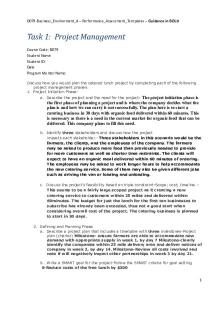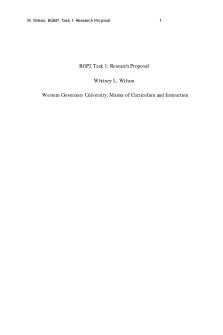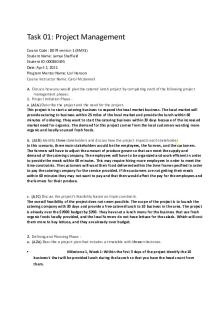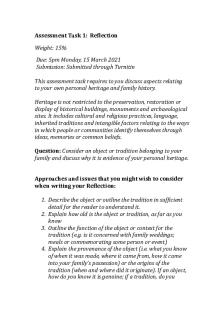D096 Task 1 - D096 Task 1 Fundamentals of Diverse Learners PDF

| Title | D096 Task 1 - D096 Task 1 Fundamentals of Diverse Learners |
|---|---|
| Course | Fundamentals of diverse learners |
| Institution | Western Governors University |
| Pages | 4 |
| File Size | 61.8 KB |
| File Type | |
| Total Downloads | 99 |
| Total Views | 136 |
Summary
D096 Task 1 Fundamentals of Diverse Learners...
Description
Task 1 Elementary Case Study
A. I come from a long line of educators. My mother and father were both school building administrators. Two of my aunts, an uncle, as well as a few immediate cousins are teachers. These incredible teachers before me taught me the values of truthfulness and fairness. They ingrained in my brain the understanding to be truthful to yourself as well as others, and to always remain fair. With that being said, I feel like I will be an effective teacher in a classroom with a culturally diverse group of students. I will utilize the values I was taught growing up to teach my students an abundance of things they will need to be successful in the adult world. Fairness is a key issue when having a diverse group of students. I have worked with students of diverse cultures and know just how important it is to be fair with all students. I worked as a summer camp counselor for the YMCA. During this time, I worked with students from all walks of life. I had some students that their parents made sure they had on new, clean clothes each day, while other students wore the same clothes several days a week. There were some that were African American and some that were Asian or white. Regardless of their struggles or race, I made sure to treat each one of them fairly. I would show them that only their actions would define how they were treated. If they were acting out, they would lose privileges. Each child was treated with the same respect that another was. By not discriminating against them, I was
able to demonstrate to them the value of fairness. When I have a class of my own, I will teach them that their cultural background should not, and will not, have an affect on how I treat them. I will make sure to grade, discipline, and teach fair. Fairness is a value that many people admire and wish to possess, especially in our world today. Truthfulness is also a core value of mine, and as a teacher, it is important for me to steer learners with this value to navigate life and their environment. Teaching students the values of truthfulness and fairness will encourage them to be more empathetic towards others, be more open minded, and prepare them for a diverse workplace in the future. B. After reading the case study, I noted several things that would affect Amhed’s ability to learn. Amhed has an auditory processing disorder, as well as an SLD in reading. This makes academic language a challenge for him, even though he can communicate in English. His adoptive family is fluent in both English and Arabic, which produces another learning challenge. Since his family is fluent in Arabic, it is hard to solely use English all the time. Amhed is not using solely English at home to better his understanding of English; therefore, creating the challenge of only attempting to better his English when at school. Equity pedagogy is an important element in the success of Amhed reading and understanding English. As Amhed’s teacher, it is important to understand things about his culture in order to help him reach his goals. Figuring out how he learns and ways you can incorporate his culture in order for him to be motivated to learn and succeed. One thing his teacher could do is allow him the opportunity
to work with a group and create a powerpoint presentation where they research his culture and teach the class. Another thing Amhed could do is teach possibly a science experiment on heat by cooking a dish from his culture and teach the class about his culture in that aspect. By doing this, the teacher is utilizing equity pedagogy in order to allow Amhed to experience cooperative learning as well as incorporating his personal culture in order to positively impact learning outcomes for him.
References
Cultural identity and teaching. On Point National Institute for Urban School Improvement. Accessed 2019 September 7. Retrieved from http://www.niusileadscape.org/docs/FINAL_PRODUCTS/NIUSI/toolkit_cd/4 %20%20Implementing%20Change/OnPoints/OP_cultural_identity.pdf
Classroom activities: Shape up (identity). Teaching Tolerance. Accessed 2019 September 7. Retrieved from https://www.youtube.com/watch? v=eNqAOnPS4UE Practicing native culture, building identity, fostering achievement. IES Regional Educational Laboratory Program. Accessed 2019 September 7. Retrieved from https://ies.ed.gov/ncee/edlabs/regions/northwest/blog/practicing-nativeculture.asp...
Similar Free PDFs

PCE Task 1 - Task 1
- 2 Pages

Task 1 - SUS101 Task 1
- 2 Pages

Qht1 task 1 - Task 1
- 3 Pages

QBM1 Task 1 - Task 1
- 5 Pages

C365 - Task 1 - Task 1
- 4 Pages

Task 1 - C226 Task 1
- 11 Pages

C304 Task 1 - TASK 1
- 16 Pages

DIT1 TASK 1 - Task 1
- 4 Pages

D078 Task 1 - task 1
- 2 Pages

Task d079 copy - Task 1
- 3 Pages

HMc Daniel Task 1 - Task 1
- 9 Pages

C227 Task 1 - Passed Task
- 22 Pages
Popular Institutions
- Tinajero National High School - Annex
- Politeknik Caltex Riau
- Yokohama City University
- SGT University
- University of Al-Qadisiyah
- Divine Word College of Vigan
- Techniek College Rotterdam
- Universidade de Santiago
- Universiti Teknologi MARA Cawangan Johor Kampus Pasir Gudang
- Poltekkes Kemenkes Yogyakarta
- Baguio City National High School
- Colegio san marcos
- preparatoria uno
- Centro de Bachillerato Tecnológico Industrial y de Servicios No. 107
- Dalian Maritime University
- Quang Trung Secondary School
- Colegio Tecnológico en Informática
- Corporación Regional de Educación Superior
- Grupo CEDVA
- Dar Al Uloom University
- Centro de Estudios Preuniversitarios de la Universidad Nacional de Ingeniería
- 上智大学
- Aakash International School, Nuna Majara
- San Felipe Neri Catholic School
- Kang Chiao International School - New Taipei City
- Misamis Occidental National High School
- Institución Educativa Escuela Normal Juan Ladrilleros
- Kolehiyo ng Pantukan
- Batanes State College
- Instituto Continental
- Sekolah Menengah Kejuruan Kesehatan Kaltara (Tarakan)
- Colegio de La Inmaculada Concepcion - Cebu



